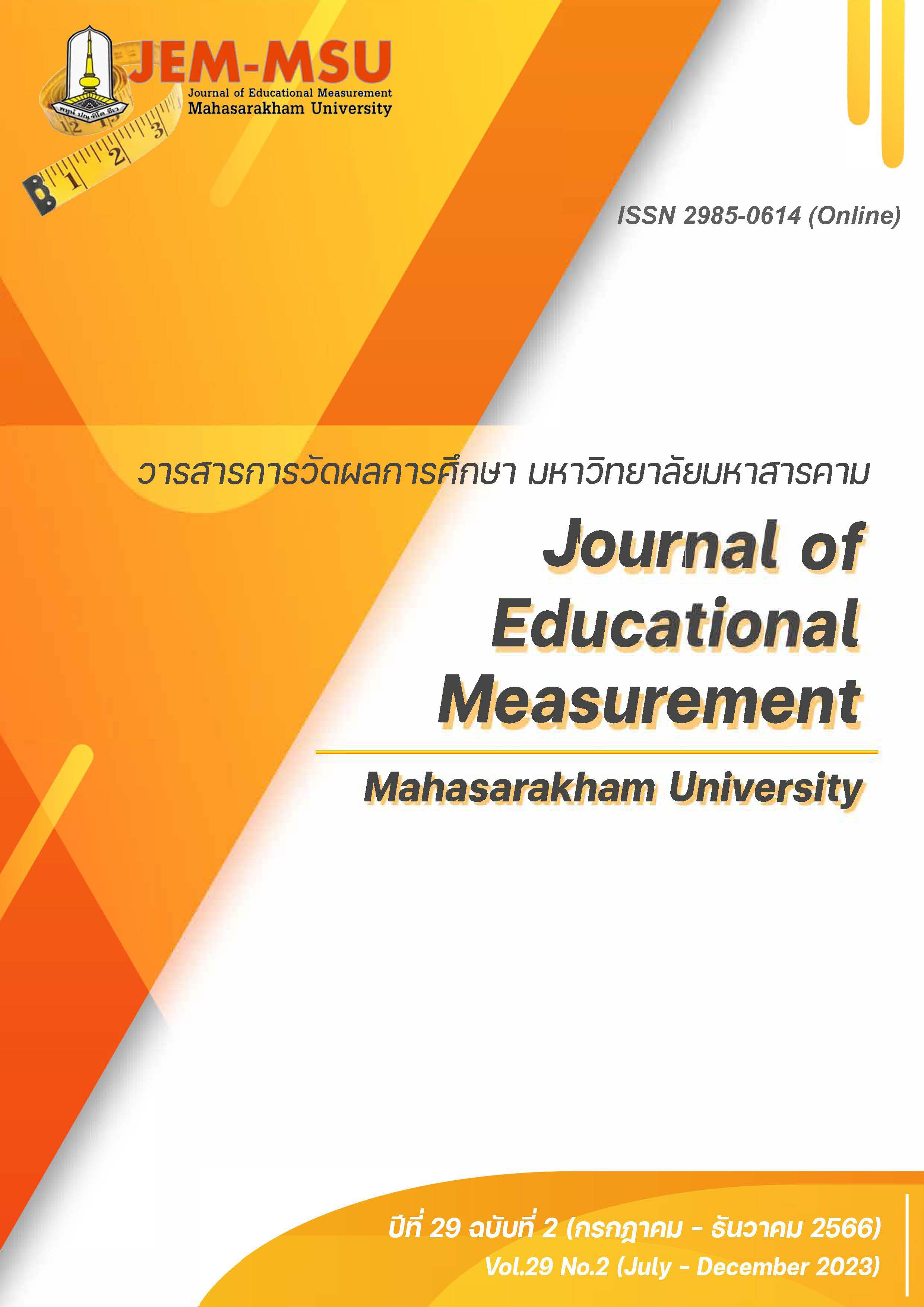Exploratory Factor Analysis of Self-Efficacy in English Reading of Tertiary Education Students
Main Article Content
Abstract
The purpose of this research was to investigate the exploratory factors of self-efficacy in English reading of tertiary education students. The sample used in this study consisted of 520 first-year tertiary education students of a public university in Bangkok, selected by simple random sampling. The research instrument was a questionnaire on self-efficacy in English reading, with a 25-item rating scale. The index of item congruence (IOC) ranged from 0.67 to 1.00, and the reliability was .897. The data were analyzed using descriptive statistics, exploratory component analysis by principal component analysis (PCA) and orthogonal rotation by Varimax method. The results showed that the self-efficacy in English reading of the tertiary education students consisted of 6 components, namely: 1) recognition of content elements, 2) assessment of content, 3) summary of content, 4) opinion on content, 5) comprehension of content, and 6) reading strategy on content, with an eigenvalue ranging from 1.016 to 7.895. These components could explain the cumulative variance for 60.461%.
Article Details

This work is licensed under a Creative Commons Attribution-NonCommercial-NoDerivatives 4.0 International License.
The content and information contained in the published article in the Journal of Educational Measurement Mahasarakham University represent the opinions and responsibilities of the authors directly. The editorial board of the journal is not necessarily in agreement with or responsible for any of the content.
The articles, data, content, images, etc. that have been published in the Journal of Educational Measurement Mahasarakham University are copyrighted by the journal. If any individual or organization wishes to reproduce or perform any actions involving the entirety or any part of the content, they must obtain written permission from the Journal of Educational Measurement Mahasarakham University.
References
Alderson, J.C. (2000). Assessing reading. Cambridge University Press.
Bandura, A. (1997). Self-efficacy: The exercise of control. Freeman.
Burrows, L. (2012). The effects of extensive reading and reading strategies on reading self-efficacy [Unpublished Doctoral dissertation]. Temple University.
Cummins, R.A., & Gullone, E. (2000). Why we should not use 5-point Likert scales: The case for subjective quality of life measurement. National University of Singapore, Proceedings, Second International Conference on Quality of Life in Cities.
Dornyei, Z., & Taguchi, T. (2010). Questionnaires in Second Language Research: Construction, Administration, and Processing (2nd ed.). Routledge.
Forzani, E., Leu, D.J., Yujia Li, E., Rhoads, C., Guthrie, J.T., & McCoach, B. (2021). Characteristics and validity of an instrument for assessing motivations for online reading to learn. Reading Research Quarterly, 56(4), 1-20. https://doi.org/10.1002/rrq.337
Hair, J.F., Black, W.C., Babin, B.J., & Anderson, R.E. (2010). Multivariate data analysis (7th ed.). Pearson.
Kakaew, J., & Damnet, A. (2017). Learning strategies model to enhance Thai undergraduate students' self-efficacy beliefs in EIL textual reading performance. Advances in Language and Literary Studies, 8(6), 19–27. http://dx.doi.org/10.7575/aiac.alls.v.8n.6p.19
Koşar, G., Akbana, Y.E., & Yakar, L. (2022). Development and validation of a reading self-efficacy scale. International Journal of Assessment Tools in Education, 9(1), 203-219.
Kula, S.S., & Budak, Y. (2020). Self-efficacy perceptions scale for reading comprehension of 4th grade students in primary school: Validity and reliability study. Bartın University Journal of Faculty of Education, 9(1), 106-120.
Li, Y., & Wang, C. (2010). An empirical study of reading self-efficacy and the use of reading strategies in the Chinese EFL context. Asian EFL Journal, 12(2), 144–162.
Mullins, L. A. (2018). Personalized texts and second language reading: A study in self-efficacy [Master’s thesis]. Georgia State University.
Nonsawang, N. (2019). The relationship between self-efficacy and reading comprehension of secondary school students [Master’s thesis]. Thammasat University.
Tucker, L.R., & MacCallum, R.C. (1997). Exploratory factor analysis. University of Illinois.
Zare, M., & Davoudi Mobarakeh, S. (2011). The Relationship Between Self-Efficacy and Use of Reading Strategies: The Case of Iranian Senior High School Students. Studies in Literature and Language, 3(3), 98-105. https://doi:10.3968j.sll.1923156320110303.148
Charubusp, S. (2010). Effects of academic literacy-based intervention on Thai university students’ English reading proficiency and reading self-efficacy [Master’s thesis]. Chulalongkorn University. (in Thai)
Kanjanawasee, S. (2013). Classical Test Theory (7th ed.). Chulalongkorn University Press. (in Thai)
Lawthong, N. (2016). Creating educational research tools. Chulalongkorn University Press. (in Thai)
Seangpakdeejit, R., Mungkunsan, C., Chaisiri, P., & Maneekanon, O. (2018). A Qualitative Research: Reading Strategies in English Academic Reading. Journal of Humanities and Social Sciences Loei Rajabhat University, 1(2), 33-51. (in Thai)
Suriyawong, S. (2007). Factor Analysis. Ramkhamhaeng University Press. (in Thai)
Tirakanant, S. (2010). Analysis of Multiple Variables in Social Science Research. Chulalongkorn University Press. (in Thai)


